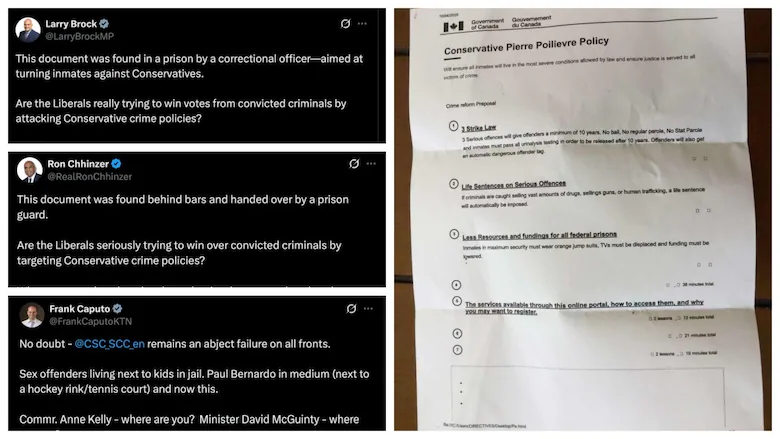The controversy surfaced after reports emerged that inmates in at least one correctional institution had received a document that framed Conservative policies in a negative light while seemingly promoting Liberal positions on justice and rehabilitation. The Conservatives argue that the material was crafted to influence the political opinions of prisoners and discourage them from voting Conservative.
The Conservative Party has filed formal complaints and called for an investigation into the source of the document, questioning whether it originated from within the government or was distributed by third parties with political motives. They assert that the messaging unfairly characterizes their stance on criminal justice as harsh and unsympathetic, while painting the Liberals as more compassionate and reform-minded.
CBC News reviewed the document and found that while it does not explicitly endorse any political party, the language used and comparisons drawn between Conservative and Liberal policies appear slanted. The document refers to past decisions by Conservative governments regarding prison conditions and rehabilitation programs, contrasting them with recent Liberal reforms in a tone that some experts say could be interpreted as persuasive rather than informational.
Correctional Service Canada (CSC) stated that it had no knowledge of any officially sanctioned political materials being distributed in prisons and is currently reviewing the matter. A spokesperson confirmed that political campaigning or the dissemination of partisan materials is strictly prohibited in federal correctional institutions.
Meanwhile, Liberal representatives have denied any connection to the document, stating they were unaware of its existence prior to the news coverage. The party emphasized that any attempt to influence incarcerated individuals’ votes must be examined through a non-partisan lens to protect the democratic process.
This incident has reignited the debate over voting rights for prisoners in Canada and how political information reaches them. Critics argue that incarcerated individuals, like any other citizens with voting rights, deserve access to neutral, factual information rather than politically charged narratives.
As the investigation unfolds, the Conservatives are calling for transparency and accountability, warning that the presence of such materials could undermine public confidence in the fairness of Canada’s democratic institutions.

